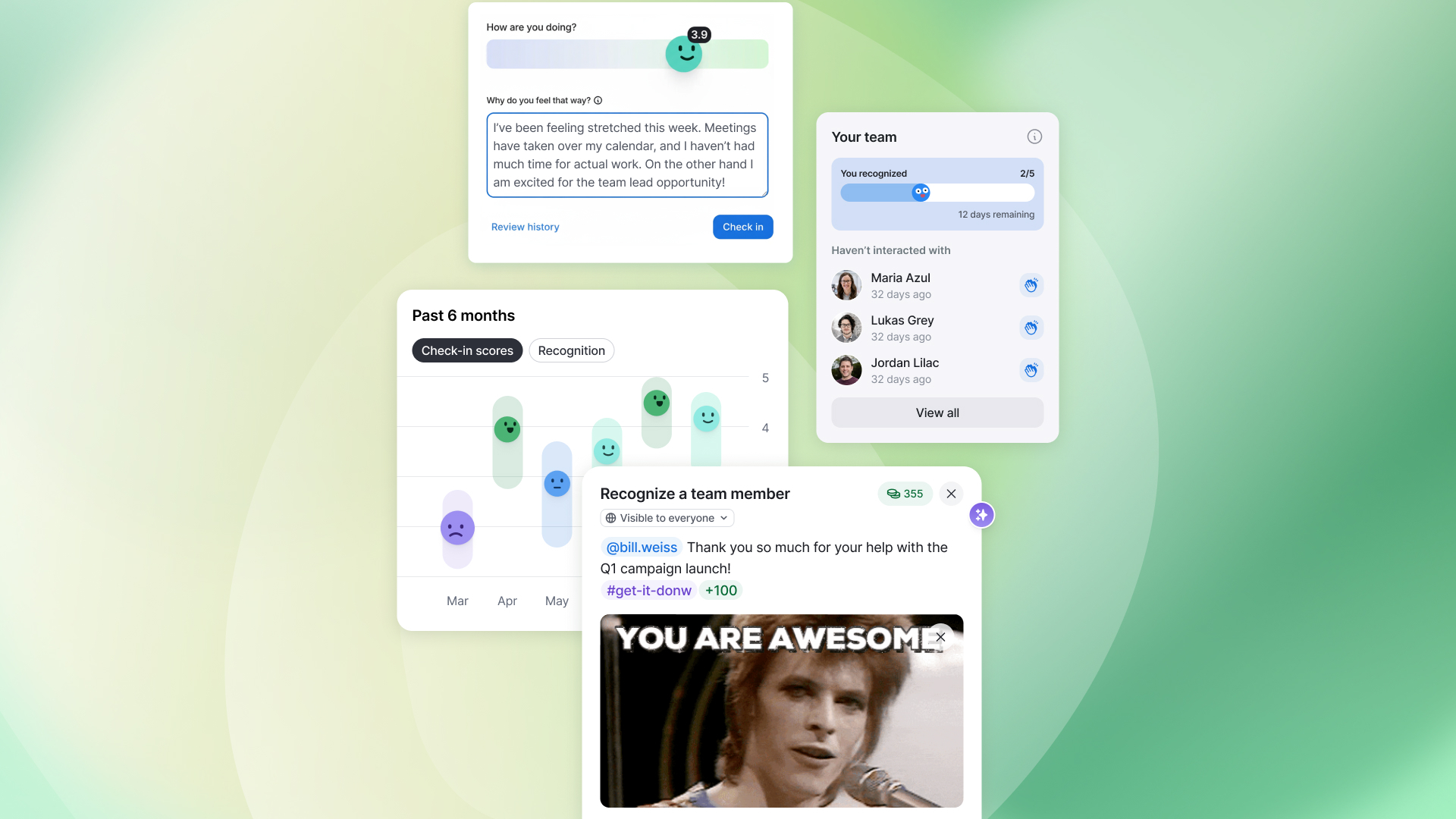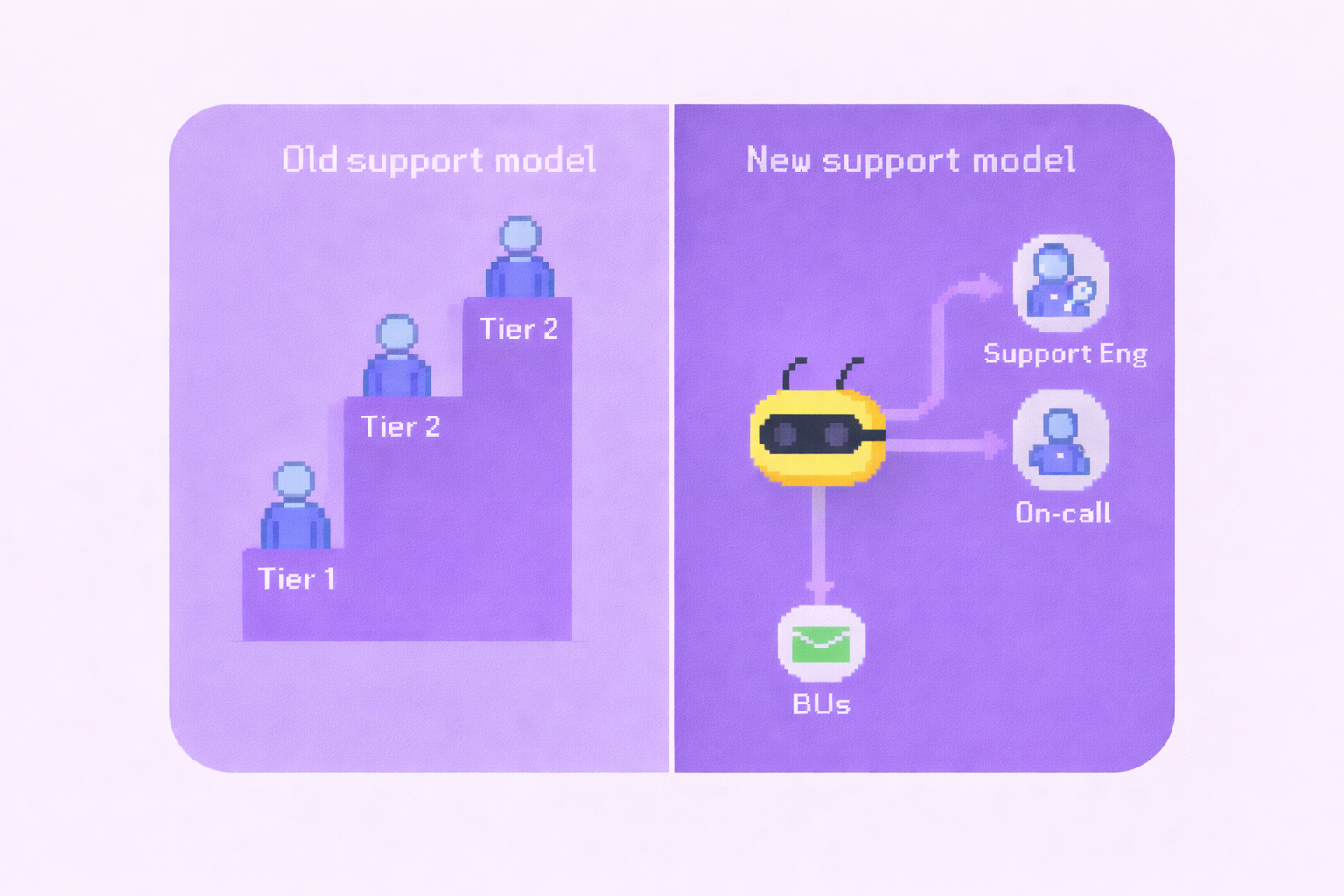How to Boost Employee Morale and Experience Its Many Benefits

The benefits of attaining a high level of employee morale are phenomenal. Luckily, building morale isn't as difficult as some believe.
Just skimming some of the benefits of high employee morale would make any employer want to boost morale in their organization:
- Improved productivity
- Greater attention to the important details because they care about the outcome of a project.
- Better attendance as employees are more excited to come to work
- More creativity in solving problems, completing projects, and satisfying customers
- Increased quality when employees care about what's being produced
- Safer work environment when teams avoid risky shortcuts that could cause injury
The question remains: Are we successful because of a high level of morale or a higher ratio of engaged employees?
Improve your employee experience and start building stronger, more resilient teams today.

Which came first?
High employee morale has been attributed to increased employee engagement. Engaged employees have a higher level of morale and are more apt to provide the results an employer desires. Other elements factor into generating employee engagement, but most of them fundamentally rely on boosting employee morale.
For example, improving communication channels, privately and publicly recognizing great work, and clarifying goals all help to boost morale. These actions also support greater employee engagement. The difference is that an employee may report a high level of morale but something might cause him to become disengaged in his work.
On the other hand, highly engaged employees might experience low morale. Eventually, these workers lose the emotional connection to their work and their organizations suffer from poor productivity. These are the clock-watchers and the hangers-on. They may even share their discontentment with others in the workforce.
While high employee morale and employee engagement are related, they are not the same thing. Employee morale is typically associated with feelings of well-being and job satisfaction. Engaged employees may be satisfied with their jobs, but contented employees are not necessarily engaged with their work. Having high employee morale is the foundation upon which employee engagement can grow and thrive.
According to BusinessSolver, 98% of HR professionals and 92% of employees surveyed said empathetic employers drive staff retention. Both engaged employees and employees with high morale are more likely to stay at their jobs.

Achieving a high level of morale
Boosting employee morale isn’t a one-time effort that generates long-lasting desired effects. Though there are some set-it-and-forget techniques to support employees, fostering high morale requires routinely taking the pulse of your employees while tweaking the procedures that work.
Here are four action items you can begin immediately to build high employee morale:
1. Respect employees by recognizing them
A recent SHRM survey found that 65% of employees say the respectful treatment of employees at all levels is a very important contributor to their job satisfaction. Respect can be shown in many ways and personalized approaches make a considerable difference.
One way to show respect is by giving genuine recognition. In “Trends in Employee Recognition” by World at Work, the common reasons cited for not having a recognition program in place are senior management's lack of support (28% of over 5,000 surveyed) and the cost (26%). Although employers are spending $46 billion per year on employee recognition, work anniversaries, and reviews, employee morale is not as high as it could be.
84% of Highly Engaged employees were recognized the last time they went above and beyond at work compared to only 25% of Actively Disengaged employees. - Bonusly's Engagement and Modern Workplace Report
A Reward Gateway study revealed that “[a]lthough more than 22% of senior decision-makers don’t think that regular recognition and thanking employees at work has a big influence on staff retention, 70% of employees say that motivation and morale would improve 'massively' with managers saying thank you more.” Investing in a good recognition program is essential to developing a workforce with high morale.
To maintain a competitive edge, top company leaders know the importance of employee experience in building motivated, engaged, and high-performing teams.
2. Pave a path
Helping employees identify their career paths and develop necessary skill sets is another way to boost employee morale.
Most business leaders believe that helping employees develop their career paths is important, but many don’t take action. SHRM reports that in a study by global staffing firm Randstad, "73% of employers said fostering employee development is important, but only 49% of employees said leadership is adhering to this practice."
Career mobility is not just about providing career opportunities, but about providing job enlargement and job enhancement opportunities as well. Employers can do this by establishing fair promotional policies and following them, ensuring smooth transitions for newly promoted employees, and providing career coaching to all employees.
3. Match skills to work
One of the best ways to grow and develop employees is to identify how they most naturally think, feel, and behave, and then strengthen those innate talents to improve performance. When employees know you care about using their natural talents and abilities in the most productive way, their morale improves.
The key here is that you need to do more than clarify work expectations, get people what they need to do their work, provide professional development, and promote positive coworker relationships.
Those efforts do indeed create greater employee engagement, but they don't necessarily boost employee morale. As we already discovered, an employee can be content and report high morale but still not be fully engaged in their work.
To improve morale, see to it that every employee feels they are doing a job that matches not just their knowledge, skills, and ability, but also their passions. Offer a DISC personality test (or an equivalent) to determine what work employees are best suited to do. Not everyone is suited for customer service and some great customer service employees might be working on the loading dock. When possible, strive to match individual personalities to the most suitable positions.
4. Continually assess morale
A Harvard Business Review piece shares the story of how agricultural equipment manufacturer John Deere (Deere and Company) has created a system for surveying the motivation of its employees every two weeks. Frequently keeping a close eye on how employees actually feel has helped all divisions of the company improve productivity by improving morale.
Deere and Company noticed that a high-performing employee scored his motivation as being lower than normal. Though there were no signs of a decrease in productivity or engagement, the employee’s motivational score dropped even lower two weeks later. In conversation, his manager learned that this employee was concerned about his career development; his manager was able to resolve the problem and keep that employee on track.
If John Deere hadn’t kept a close eye on the morale of its employees, this particular employee may have become completely disengaged as well as disgruntled. Unfortunately, most managers only become aware of an issue during an annual or semi-annual performance review or worse, after the employee makes a glaring mistake or simply quits.
5. Give employees ownership
Employees need to have a stake in the company's success. This doesn't necessarily mean having a stock or a profit-sharing plan.
A large part of building strong engagement and morale that many leaders neglect is the emotional stake employees have in their organization. Employees need to know the work they're doing is valuable, that it has a purpose, and that they have a say in how that value is produced. Employees who 'own' their job embrace accountability instead of being 'held to' it.
Laszlo Bock had a great chapter in his recent book Work Rules! that superbly covered this subject of ownership, titled "Becoming a Founder."
"Building an exceptional team or institution starts with a founder. But being a founder doesn't mean starting a new company. It is within anyones's grasp to be the founder and culture-creator of their own team..."
6. Take responsibility, not credit
There's nothing more demoralizing than putting your heart and soul into something, only to have someone else take the credit for it. Most of us have experienced this firsthand at some point in our lives, and nearly all of us have at least witnessed it.
"A great leader takes responsibility for the success of an organization, but not the credit for it."
It's important for employees to get credit for the contributions they're making. If they don't get the credit they deserve, or worse yet, if the credit is given to someone else, morale is almost guaranteed to plummet.

Improve employee experience to build resilient, engaged, and motivated teams today.
What will you do next?
The majority of the US workforce is not engaged, according to Gallup's “State of the American Workplace” report. Since we know that high morale is a springboard for increasing employee engagement, take the pulse of your workforce today to determine the level of morale in your organization.
If it is not at a high level, take action. Implement the above steps or get creative with your own actions to improve morale. Studies have shown that there is a direct correlation between the level of morale and the relationship between employees and their managers. Go way outside the box to discover ways to improve morale.
A good place to start is reading “4 Ways Your Phone Can Improve Employee Morale” by our cofounder, Raphael Crawford-Marks, in which he offers further tips you can adopt in your organization today.
If you're ready to take the next step toward building a stronger, more engaging organizational culture, check out our latest guide:







